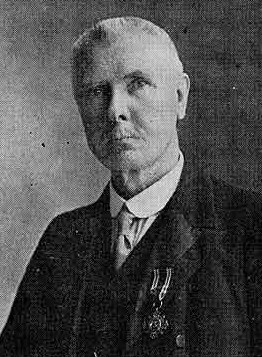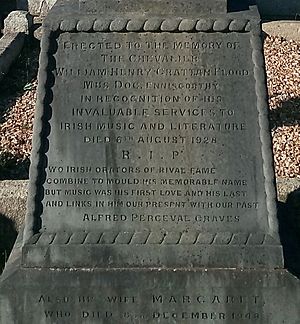W. H. Grattan Flood facts for kids
Quick facts for kids
Chevalier
W. H. Grattan Flood
|
|
|---|---|
 |
|
| Born |
William Henry Grattan Flood
Lismore, County Waterford, Ireland
|
| Baptised | 1 November 1857 |
| Died | 6 August 1928 (aged 68) Enniscorthy, County Wexford, Ireland
|
| Spouse(s) |
Margaret Delaney
(m. 1898) |
| Children | 6 |
| Awards | Pro Ecclesia et Pontifice |
William Henry Grattan Flood (born November 1, 1857 – died August 6, 1928) was a famous Irish writer, musician, and historian. He wrote many books about Irish music and history. He also composed music, especially for churches.
He was given special awards by the Pope. In 1917, he received the Pro Ecclesia et Pontifice award. In 1922, he became a Chevalier in the Order of St Gregory. This is why people often called him "Chevalier Flood." He is not the same person as the Irish politicians Henry Flood or Henry Grattan.
Contents
Biography
William Henry Grattan Flood was born in Lismore, County Waterford, Ireland. His family helped him a lot with his education. His parents, William and Catherine Flood, worked at the Lismore Workhouse.
He had one older sister and five brothers. William started learning music at a young age. His aunt, Elizabeth FitzSimon, gave him music lessons. He quickly became a very good piano player.
When he was only nine, he played music for the Duke of Devonshire. This happened at Lismore Castle. He went to Mount Melleray school from 1872 to 1876. During this time, he also had private music lessons.
He learned from Sir Robert Prescott Stewart. William became skilled at playing many musical instruments. He worked as an organist in several cathedrals. These included St. Peter's Pro-Cathedral in Belfast and the Cathedral of the Assumption in Thurles, County Tipperary.
He also worked at Monaghan Cathedral and St. Aidan's Cathedral in Enniscorthy. He was a very religious Catholic. He studied to become a priest at St. Patrick's in Carlow, County Carlow.
He also taught music at several colleges. These included Clongowes Wood College and St. Kieran's College in Kilkenny. He lived in Enniscorthy for a long time, from 1895 to 1928. Most of his music and history books were written during these years.
In 1907, he received an honorary Doctor of Music degree. This was from the Royal University of Ireland. While he was the organist in Enniscorthy, he found a local song. It was called the Wexford Carol. He wrote it down and had it published. This helped the Wexford Carol become known around the world.
In December 1898, he married Margaret Delaney. They had six children over the next 12 years. Their children included Catherine (Kathleen), Mollie, Agnes, William, Patrick, and Margaret (Rita). After William Flood passed away, his daughter Kathleen became the organist at St. Aidan's. She held this job until she died in 1956.
William Henry Grattan Flood is a bit of a debated figure in Irish music history. He inspired many new studies. However, sometimes his facts were not completely accurate. He was very enthusiastic about details but not always thorough.
His books sometimes had information that was not quite right. This was often because of his strong national and religious beliefs. He had access to old records that were later destroyed in a fire in 1922. But when his sources can be checked, he sometimes misquoted them. He also sometimes jumped to conclusions that he presented as facts.
Despite this, he wrote at a time when Irish music was often ignored. He helped bring attention to it. Some of his more adventurous claims included saying famous composers had Irish family roots. Because of this, people read his writings on music history with some care.
Selected Publications
William Henry Grattan Flood wrote many books and articles. Here are some examples of his work:
Music History Books
- A History of Irish Music (1905)
- The Story of the Harp (1905)
- The Story of the Bagpipe (1911)
- John Field, Inventor of the Nocturne (1921)
History Books
- History of Enniscorthy (1898)
- History of the Diocese of Ferns (1916)
He also wrote many articles for different journals and encyclopedias. These included the Dictionary of National Biography and Grove's Dictionary of Music and Musicians.
Compositions
William Henry Grattan Flood composed many pieces of music.
Church Music
- O salutaris hostia (1882)
- Mass in Honour of Saint Aidan (1889)
- Praised Be Jesus Christ Our King (1927)
Songs
- Evening Shades (1882)
- The Mississippi River (1910)
- The Boys of Kerry (around 1915)
Edited Collections
He also helped put together collections of other people's music:
- Moore's Irish Melodies (1910)
- Songs and Airs of O'Carolan (1913)
- The Armagh Hymnal (1915)
Memorial
A special memorial was put up in Enniscorthy after Chevalier Flood died. It is a limestone Celtic Cross with a Celtic Harp carved on it. The memorial has an inscription that honors him. It talks about his important contributions to Irish music and literature.
The inscription includes a poem by Alfred Perceval Graves:
ERECTED TO THE MEMORY OF
CHEVALIER WILLIAM HENRY GRATTAN FLOOD, ENNISCORTHY, IN RECOGNITION OF HIS INVALUABLE SERVICES TO IRISH MUSIC AND LITERATURE. DIED AUGUST 6TH 1928. ”Irish orators of rival fame – Combine to mould his memorable name; – But music was his first love and his last –
And links in him our present with our past."
 | Laphonza Butler |
 | Daisy Bates |
 | Elizabeth Piper Ensley |


